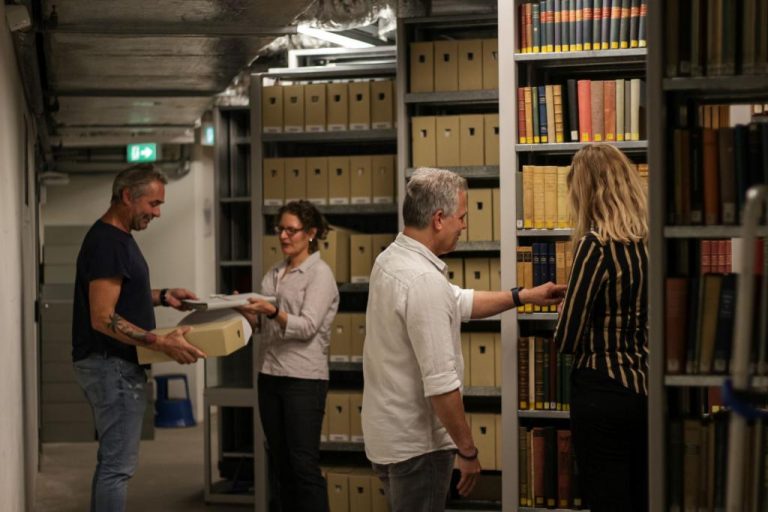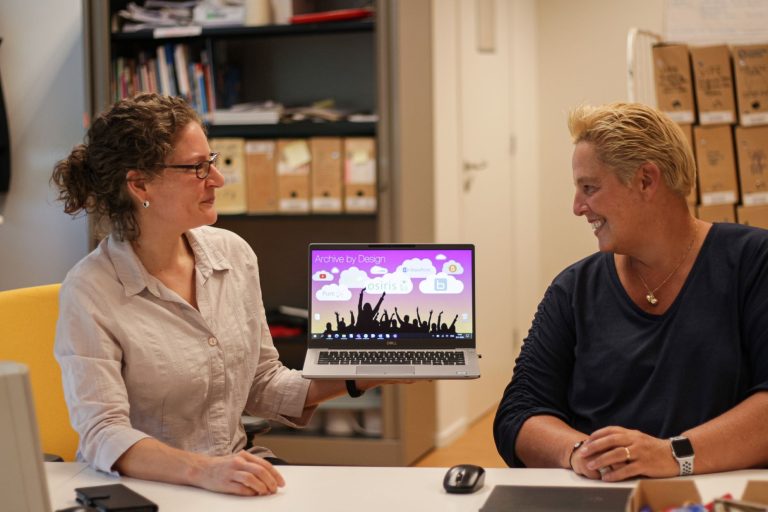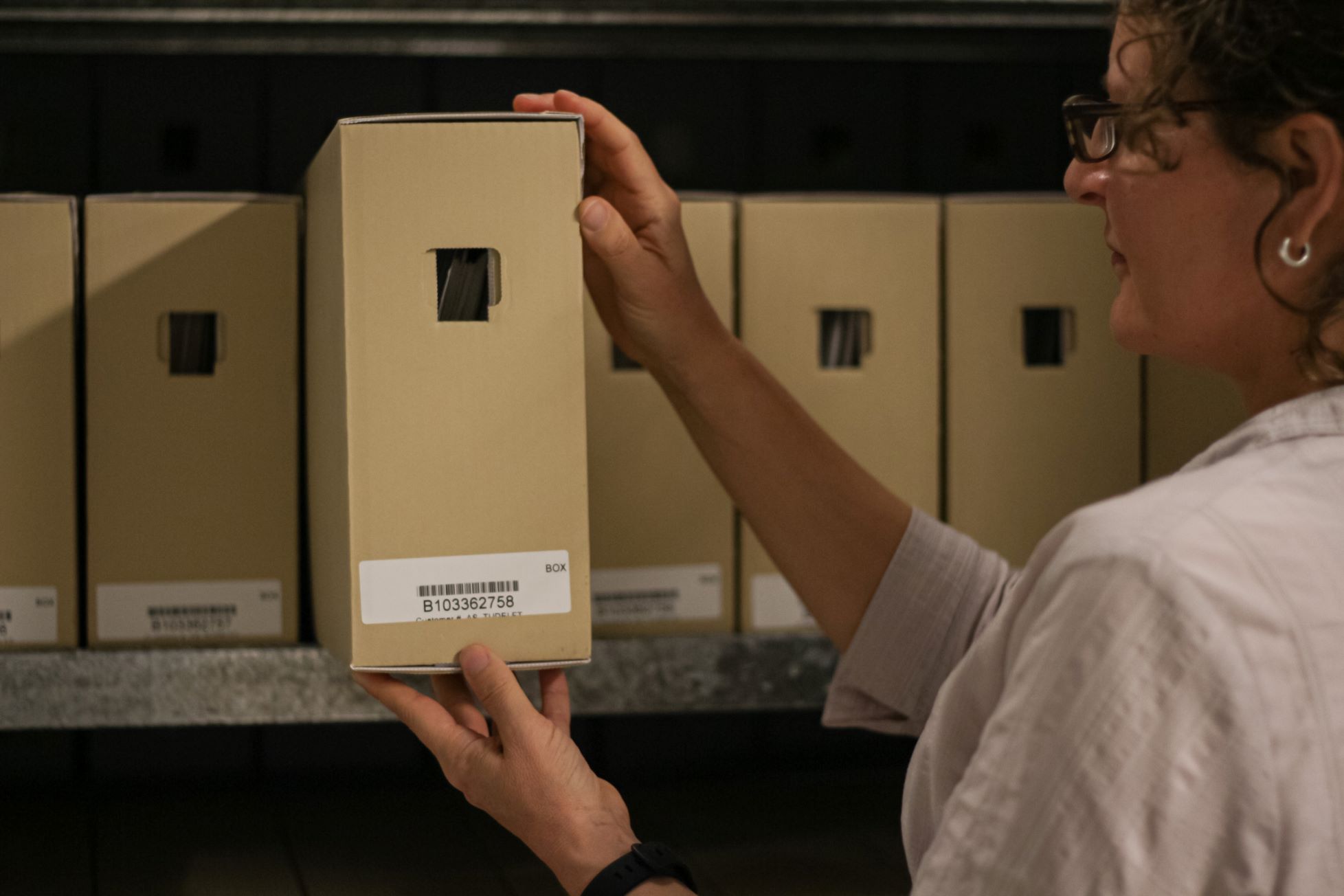Kilometres of historic documents are kept at TU Delft. For History Month, Delta delved into how the TU Delft archive came about.
TU archivist Esther Maes grabs an acid-free box of documents. (Photo: Justyna Botor)
It is Thursday, 11 December 1947. Five TU Delft administrators are meeting around a table on Oude Delft. The subject? The expansion of TU Delft, which was still the Technical University of Applied Sciences at the time. Board member Bremer suggests that the university could expand in Wippolder, Delft’s adjoining polder. His Board colleague De Lange did not think this a good idea. “Delft lacks the natural beauty of places like Wassenaar,” he says. Professor Zweers, also one of the Administrators, agrees with him. He believes that a TU Delft section would not blossom in the polder. A minute-taker notes that Bremer’s answer was that he could not change his vision.
While this discussion took place in 1947, you feel like a fly on the wall in the Boardroom. The minutes of this meeting are available in the National Archive in The Hague. This is where the vast majority of TU Delft’s memory is stored.
 From left to right: Sid Kagie, Esther Maes, Hans Kaiser and Lilette van der Does. (Photo: Justyna Botor)
From left to right: Sid Kagie, Esther Maes, Hans Kaiser and Lilette van der Does. (Photo: Justyna Botor)
“TU Delft is an independent administrative body and, in line with the Public Records Act, is required to keep certain information and make it accessible to others,” explains Esther Maes. She is the Head of TU Delft’s archiving department or, in full, the Manager of the Document Management & Archive Department. Dozens of banana boxes are piled up in the space where Maes and her team work. One box in the corner contains floppy discs. Frayed paper lies on a roll container. “We don’t know exactly what this,” says Maes, looking at the rolls of paper.
How was the storm umbrella invented?
Thanks to her Department, where she has now worked for 12 years, all decisions and important documents about TU Delft are accessible to historians, hobbyists, policymakers and anyone else who wants to know about the history of TU Delft. They might want to know how the storm umbrella was invented? Why and how the Robotics Department was established? Or how TU Delft acquired its campus ground of more than 169 hectares? The answers to all these questions are in the archive. They are stored, made accessible and organised logically by Maes and her predecessors.
“Our most important task is to ensure that decisions and events at TU Delft can be reconstructed through the centuries. An education review committee, for example, should be able to easily find out why a degree programme was started up, how it has changed, and why it was ultimately ended,” explains Maes.
What should we keep?
So what is kept? This is quite a long list that includes: Executive Board decisions, annual reports, strategic documents, student numbers, written exchanges between administrators, acquisition documents for buildings etc. The faculties submit their documents to the Document Management & Archive Department after which Maes and her colleagues decide what should be kept and what can be thrown away.
Once in a while Maes is phoned by the children of TU Delft staff members who have passed away. “They often say that they found all sorts of papers in the attic or in the cellar with TU Delft’s logo. We usually go and have a look as they could be of interest. It could just be from a researcher, for example, who has taken things home that they should not have removed such as research documents that led to an important invention.”
Three piles
The staff members of the Document Management & Archive Department divide the documents, books and drawings that they receive into three piles: destroy immediately, keep temporarily, and keep forever. “Invoices must be kept for seven years, after which they can be destroyed,” explains Maes. “They go to a temporary depot in The Hague that TU Delft rents. Everything that must be kept forever – such as Executive Board decisions and strategic documents – go to the National Archive.” While explaining this, Maes walks around the ‘book and journal depot’ in the TU Delft Library. She stops and points to a bookshelf full of dark grey carton boxes. “These are acid free boxes that preserve the documents longer. Touch, sunlight and certain temperatures can be disastrous for paper. Once we have filled up a whole section with full carton boxes, we can hand them over to the National Archive.
‘Name changes are bad news for archivists’
Maes and her colleagues sometimes come up against “typical TU Delft problems”, she says. Departments tend to change their names frequently. Take the Campus Real Estate & Facility Management Department for example. Until recently it was called Campus Real Estate. And before that, the Real Estate Department. They may be logical sequential names, but they are horrendous for archivists. “An unsuspecting person that wants to research real estate in the archives does not know that. So you need to make sure that researchers can find all the important documents they need without their knowing the exact name of the department in question.”

Maes’ team is now starting the process of creating a digital archive. It is important that every staff member stores their documents using logical names directly in the right applications. “Every TU Delft staff member is an archivist,” says Maes. Maes and her team have decided that, as far as possible, digital documentation must be archived in the sources themselves. This means that everything related to study materials are archived in Brightspace; student files in Osiris; invoices in Basware or Alusta; and, research publications in Pure.
“This will help people who do research on revisions to a course at a later point as they will know that they need to be in the Brightspace archive.”
Maes is currently discussing how the Covid crisis should be archived with her peers at other universities. The idea is that historians in the future can carry out research on the topic. “You want to record, for example, why TU Delft went into lockdown.” Maes and her peers at other universities call subjects like Covid a ‘hotspot’. Other hotspots include the occupation of the Amsterdam Maagdenhuis (1969) and the hacking of Maastricht University (2019). “I secretly hope that we get a real TU Delft hotspot!” jokes Maes.
The last picture shows Esther Maes (left) Bianca Wijnmaalen-Poot (right).
Do you have a question or comment about this article?
a.m.debruijn@tudelft.nl


Comments are closed.